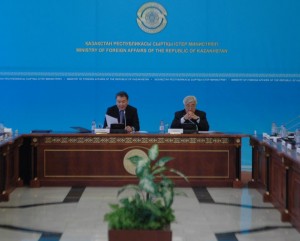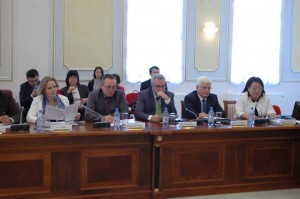ASTANA – Based on the annual increase of more than 100,000 claims filed with the courts during the last five years, Kazakhstan citizens appear to have a growing trust in the judiciary, Chairman of the Supreme Court Kairat Mami said during an Oct. 20 address to the diplomatic corps.
 “It is no secret that Kazakh citizens prefer to go to court than to higher state bodies, to the arbitrators or mediators. The number of claims submitted every year to the courts has increased from 539,487 to 647,229. This is a clear indication of the efficiency of the judicial processes available to people,” he stressed during a briefing on the rule of lawwhich took place at the Ministry of Foreign Affairs.
“It is no secret that Kazakh citizens prefer to go to court than to higher state bodies, to the arbitrators or mediators. The number of claims submitted every year to the courts has increased from 539,487 to 647,229. This is a clear indication of the efficiency of the judicial processes available to people,” he stressed during a briefing on the rule of lawwhich took place at the Ministry of Foreign Affairs.
In his statement, Mami highlighted the main areas of work done by the judicial bodies to modernise national justice and strengthen the judicial mechanisms for the protection of rights and legitimate interests of citizens.
“Despite the importance of improving legislation, a central component of any independent and fair justice system is the figure of the judge. The professional development of judges, their skills and moral qualities is one of the main priorities of the Supreme Court,” Mami underscored.
“This year, reforms to the personnel policy of the judiciary have been approved. The new concept is aimed at a further increase in transparency and consistency in the selection and appointment of judicial personnel. Judges undergo training at the Institute of Justice at least once every five years and every three years take part in internships in a higher court,” the Chairman of the Supreme Court told the ambassadors.
Kazakhstan’s key priorities for the development of the justice system are set out in the Concept of Legal Policy for 2010-2020. It explains that the country is currently focused on strengthening the independence of the judiciary, ensuring an affordable and quick resolution of legal disputes and regular implementation of the principles behind international law in legislation and the judicial system.
In line with the concept, the Supreme Court together with the government is actively working to strengthen legal protections, create an effective civil and administrative process and develop the institutions of pre-trial proceedings.
Currently, the Senate of the Parliament is considering a draft law aimed at simplifying civil proceedings. A new Code of Civil Procedure has been drafted, while the adoption of the new Criminal Code, Criminal Procedure Code, Executive Penal Code and Code of Administrative Offences this year became the next step in the implementation of the concept.
“Our country faces the challenge of forming new national legislation that will work within current systems while ensuring the competitiveness of Kazakhstan’s legal system,” Mami noted. “The main message of our new model of criminal justice is that we are determined to reduce the number of laws restricting citizens’ rights to exercise their civil rights and obligations. We want people to feel empowered to implement entrepreneurial initiatives.”
 Another of the government’s key goals is to fulfil the vision set out in the national long-term Kazakhstan 2050 Strategy. A strong judicial system is essential [to our country] becoming one of the 30 most-developed nations in the world. Modern technology can simplify and speed up proceedings, too, the speaker noted.
Another of the government’s key goals is to fulfil the vision set out in the national long-term Kazakhstan 2050 Strategy. A strong judicial system is essential [to our country] becoming one of the 30 most-developed nations in the world. Modern technology can simplify and speed up proceedings, too, the speaker noted.
“Today, the filing of claims in Kazakhstan is made using Internet resources and there is a possibility of becoming familiar with the audio and video minutes of the courts hearings and judicial acts,” Mami said.
“This year we received over 30,000 e-applications. Participants in proceedings are being notified electronically. We are pushing ahead with increasing the use of e-mail and allowing the public to put requests via the website and a call centre. Very soon, courtrooms across the country will be equipped with state-of-the-art audio and video systems and the technical means to allow participants in trials to appear remotely,” he maintained.
Yet courts are not always the best place to seek a swift resolution to a legal problem and are themselves interested in the development of extra-judicial settlements of disputes. Thus, a number of measures have been initiated to improve administrative procedures in government agencies and encourage the development of effective bodies to manage mediation and arbitration.
“We have worked on these measures collaboratively with Kazakhstan’s business community, represented by the National Chamber of Entrepreneurs, to develop a bill on arbitration and arbitration courts. We hope to involve the chamber’s representatives as mediators in disputes between businesses, including in trial proceedings,” Mami said.
Kazakhstan is currently making every effort to create favourable conditions for both the country’s business and foreign investment, which are key driving forces of the national economy. The landmark decisions in the area include legalisation of property and capital, the second wave of privatisation, reducing the tax burden and a moratorium on inspections of small and medium-sized businesses. The institute of an “investment ombudsman” was established in June for better protection of investors.
During the meeting, Mami said the Supreme Court has initiated the creation of a specialised court to hear disputes involving foreign investors.
“This, in our view, will allow an increase in the availability and the level of judicial protection for foreign investment,” he noted.
Kazakhstan’s Supreme Court is working closely with international and regional non-governmental organisations, including the United Nations offices in Kazakhstan including UN Development Programme, UN Children Fund, International Organisation for Migration and OSCE Centre in Astana, in all the aforementioned areas.
A constructive partnership within the framework of the rule of law has been formed with the European Union, German Society for International Cooperation (GIZ), Foundation for International Legal Cooperation (IRZ), Venice Commission and American Bar Association.
In his remarks, Mami stressed the importance of the rule of law for a judge, noting the legal basis for the activities of Kazakh courts is constantly improving in compliance with international best practices.
Addressing the diplomatic corps, a judge of the Supreme Court Ulbosyn Suleimenova familiarised the participants with certain provisions of the new draft code of civil procedure, explaining it has been designed to strengthen and protect the constitutional rights and freedoms of Kazakh citizens.
In his own remarks at the event, Foreign Minister Erlan Idrissov said that, according to World Justice Report for 2014, Kazakhstan occupied the 71st position out of 99 countries ranked in the rule of law index. Uzbekistan was ranked 73rd, China 76th, Kyrgyzstan 78th, and Russia 80th.
